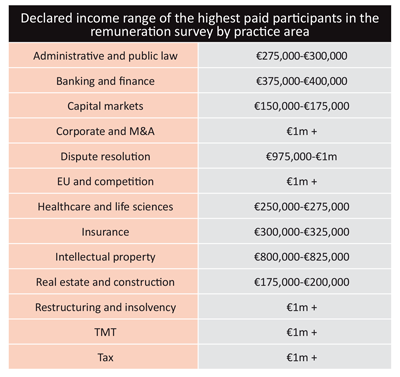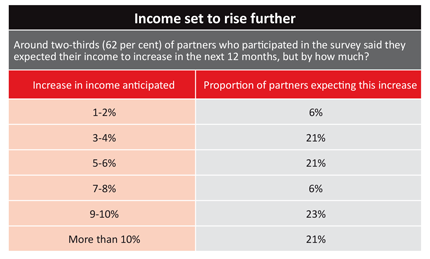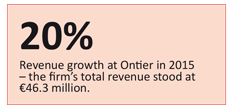Partner income growing but most would join rivals for more money
A third of partners in Spain believe their firm´s remuneration system is ineffective
Two-thirds of partners at law firms in Spain experienced a rise in their income in the last year, but the majority would consider joining another firm if it meant their remuneration increased, new research by Iberian Lawyer reveals.
A total of 65 per cent of partners at law firms in Spain who participated in the study said that they had received an increase in their income in the last 12 months. Meanwhile, 15 per cent said they last received an increase in income a year to 18 months ago. A further 5 per cent said the most recent increase in their income occurred 18 months to two years ago, while a total of 15 per cent of partners have not received an increase in income for more than two years.
Eyeing rivals?
However, despite the majority of partners taking home more money in the last year, most would consider moving to a competitor firm if it meant their income would go up. Fifty-one per cent of partners admitted they would consider joining another firm if it meant their remuneration would increase. Furthermore, 16 per cent of respondents said that, during the last year, they had considered moving to another law firm for more money.
That said, law firms would possibly have to offer fairly significant increases in remuneration if they wanted to entice partners from competitors. Around one in four (24 per cent) of survey participants said a rival firm would have to offer them more than a 50 per cent increase before they would consider moving. However, 14 per cent said they would be tempted by a 31 to 35 per cent increase in income, with a further 14 per cent saying they would consider jumping ship if a rival firm was willing to increase their remuneration by 16 to 20 per cent. Three per cent of partners said they would consider joining a rival firm if the increase in remuneration offered was only 1 to 5 per cent.
 More income growth
More income growth
Most partners seem to think their income is on a par with that received by lawyers at other firms. Two-thirds of those surveyed said they thought they were remunerated in line with the rest of the market, but 32 per cent of respondents thought they were not. However, most partners were confident that their income would grow further. A total of 62 per cent of partners said they expected their income to increase in the next 12 months. Of those that anticipated an increase in their income in the next year, the majority (51 per cent) said they expected an increase of at least 7 per cent.
Three-quarters of partners (74 per cent) said they thought they were fairly remunerated for the work they do, though one in four (26 per cent) of partners do not think their remuneration is fair. A total of 86 per cent of respondents thought women partners at their firm were fairly remunerated, though the remainder (14 per cent) did not. However, it is worth noting that 85 per cent of respondents to the survey were male.
Ineffective systems
It appears that a number of firms have more work to do before their approach to remuneration is deemed satisfactory. Nearly a third of partners (31 per cent) who responded to the survey said that their firm’s remuneration system was ineffective. One of the common concerns was that remuneration systems do not always reward partners in accordance with the amount of revenue they bring into the firm or the amount of new business they generate. One corporate and M&A partner remarked that law firm’s profits should be shared “not only as a percentage of share capital, but also by taking into account the income generated”. Another corporate partner echoed the sentiment, saying that a percentage of remuneration should be linked to “attracting clients”.
 More generosity needed
More generosity needed
One partner said his firm needed to develop a “real and objective system of evaluation”, while another, whose experience as a partner was in the 11-15 year bracket, remarked that their firm’s remuneration system could be improved by “being more generous with junior partners”.
In some instances, it appears that there is resistance on the part of some senior partners at law firms to reviewing remuneration systems. One respondent to the survey remarked: “Senior partners, aged 55-plus, must be open to new systems of remuneration.”
A total of 78 partners at law firms in Spain participated in the study, which was conducted via an online survey in July 2016. A third (32 per cent) of participants had been a partner for more than 15 years, 14 per cent had been a partner for 11-15 years, 21 per cent had been a partner for six to ten years, while 32 per cent had been a partner for five years or less.

Alejandro Kress, Iberia head at legal recruiter Shilton Sharpe Quarry, agreed that the “vast majority of partners would consider joining another firm if it meant their remuneration would increase”. However, he added that it was less likely that partners at elite Spanish law firms would move because they “don’t think of their own career versus partners at US law firms, they rather think as a community of lawyers – they are aware that their remuneration is not in line with what they bring to the firm/how much they work, but they think they want to stay in an elite community.” He continued: “The remuneration of partners in Spain has not increased significantly. The legal recruitment market in Spain is not yet affected by the Brexit effect, which is not the case in the UK.”












